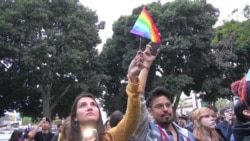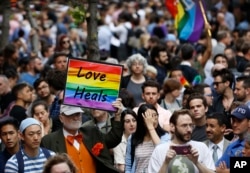In New York, Washington and Los Angeles, the gay community and its supporters have turned out for candlelight vigils and rallies in a show of unity in the face of violence.
From Vermont to Hawaii, Americans have been honoring the 49 people killed in a mass shooting in Orlando, Florida, at a nightclub popular with members of the LGBT community. And they are asking why atrocities like this continue to happen.
Public demonstrations are "really the only weapon we have left, because there's bad people with access to weapons, and we're never going to be able to stop that," said Ryan Sifferman, who was draped in a rainbow flag in front of Los Angeles City Hall, where thousands gathered Monday night.
Members of the lesbian, gay, bisexual and transgender community were joined by friends in a show of support. It was a call to stop the hatred, said John Binninger.
"It's awful. I don't really know where we go from here," Binninger said, but added that it is important for those who are grieving to stand together in public and share their emotions.
The Orlando shootings appear to be a case of homegrown terrorism, and of guns getting in the hands of the wrong people.
"It certainly also was homophobic," said Deborah Brosseau, "and we certainly need to come to a point in our culture when we can accept everyone for the beautiful beings that they are."
Those who knew the Florida gunman, Omar Mateen, 29, said he was unstable. In the midst of the shootings, he expressed allegiance to the radical group Islamic State.
"And I also am furious at the implication that religion can be used to injure people," said Robin Podolsky, a Los Angeles rabbi who is concerned about a possible backlash against her Muslim friends.
There were calls for political action, and a handful of signs denouncing Republican presidential candidate Donald Trump for his opposition to restrictions on the ownership of assault weapons such as the one used in Orlando, as well as his call for sweeping limitations on immigration.
But the tone was tearful in Los Angeles as pop star Lady Gaga and others read the names of the 49 men and women who were slain.
A group of Asian-Americans called the Vigilant Love Coalition held a banner deploring Islamophobia. The group was started by Japanese-Americans who reached out to their Muslim neighbors 15 years ago to reassure them that their religion was not to blame for the terror attacks on New York and Washington on September 11, 2001.
Kathy Masaoka says the Vigilant Love Coalition is now reaching out to friends in the gay community.
"We don't know what can be done, but we know we have to come together in unity," she said.
The mourners in California, New York, Washington and elsewhere say coming together is the first step in stopping the killings.







